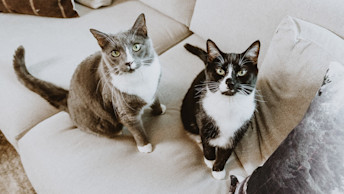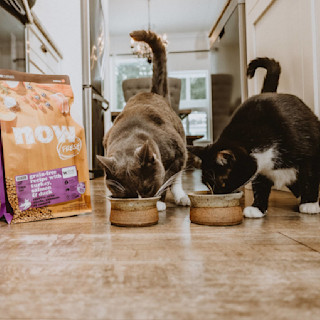October 8, 2024
Body Condition Score for Cats

The body condition score for cats is a standardized system used to evaluate your pet's physical condition and if they are underweight, overweight, or at an ideal weight. Identifying what is a healthy weight for your cat is crucial for their overall well-being, as obesity or being underweight can lead to various health problems.
Overweight cats are at a higher risk of developing diabetes, joint issues, and respiratory difficulties, while underweight cats may suffer from malnutrition, weakened immune systems, and other health complications.
How to Assess Your Cat’s Body Condition Score
To assess your cat’s BCS:
Ribs: Run your hands gently along your cat’s sides. You should be able to feel their ribs without pressing too hard, but they should not be visibly protruding.
Waist: Look at your cat from above. There should be a visible waistline between their ribs and hips.
Abdomen: When viewed from the side, your cat’s abdomen should tuck up towards their hips rather than hanging down.
Compare your observations with the cat body score chart to find their score. If you’re unsure, consult your veterinarian for a professional assessment.

Is My Cat Too Thin?
A score of 1 to 2 on the BCS chart indicates that your cat may be underweight. Signs that your cat might be too thin include:
Ribs, spine, or hip bones that are clearly visible.
Little to no fat covering the ribs.
A prominent abdominal tuck and severe waistline.
If you’re asking, “Is my cat too thin?” it’s important to evaluate their diet and overall health. Chronic illnesses, parasites, or insufficient calorie intake could be contributing factors. A veterinarian can provide guidance on addressing weight gain safely.
Is My Cat Overweight?
On the other end of the spectrum, a BCS of 4 to 5 suggests that a cat is carrying excess weight. Signs of an overweight or obese cat include:
Ribs that are difficult or impossible to feel under fat.
Lack of a defined waistline when viewed from above.
A rounded or sagging abdomen.
Carrying extra weight can put cats at a higher risk for secondary health issues like joint pain, heart disease, and diabetes. To help your cat lose weight, focus on portion control, increasing exercise, and choosing a balanced diet.
Maintaining a Healthy Weight for Cats
Ensuring your feline friend maintains a healthy weight is crucial for their overall well-being and longevity. A balanced diet and regular exercise play vital roles in keeping your cat's weight within a healthy range.
Diet is a primary factor influencing a cat's weight, and portion control is key to preventing obesity. Follow the recommended feeding guidelines provided by your veterinarian or on the cat food packaging, and resist the temptation to overfeed, especially with treats. We also recommend weighing your cat’s food using a kitchen scale for better accuracy and to help prevent overfeeding.
Remember, these guidelines are just a starting point and should be adjusted to help maintain your cat’s individual ideal weight. Factors such as exercise and environment will impact these needs. Opt for high-quality, nutrient-dense cat food that provides complete and balanced nutrition.

Our Recommendation
Grain-Free Cat Food Made with Premium Ingredients
We offer thoughtful foods made simply with fresh meats and fish and nutrient-rich fruits and veggies for easily digested nutrition and an irresistibly yummy flavor.
View cat foodExercise is equally important for weight management. Encourage your cat's natural playfulness by providing interactive toys, scratching posts, and engaging in regular play sessions. This not only helps burn calories but also enriches their environment and promotes mental stimulation.
Remember, every cat is unique, and their dietary and exercise needs may vary based on factors such as age, breed, and overall health. Consult with your veterinarian to develop a personalized plan that ensures your feline companion maintains a healthy body condition score and enjoys a happy, active life.



